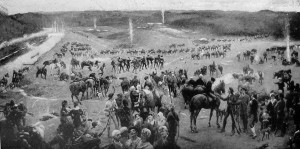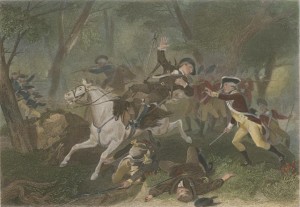captured
 October 7, 1780, was the beginning of the end of British rule in The Colonies. The Battle of King’s Mountain would be a battle that the British would never forget. Fewer than one thousand American Heroes, used skills and strategies that no one expected them to have to defeat Major Patrick Ferguson, who was the star of the British military might. Benjamin, James, Robert, and Samuel Knox, ancestors of my husband, Bob Schulenberg, were four of those heroes. The Knox brothers walked away from the battle without being wounded. In reality so did most of the 900 Patriots who participated in the battle. In the end, while the number of casualties reported varies from source to source, some of the most commonly reported figures are that 225 Loyalists had been killed, 163 wounded and 716 were captured, while only 28 Patriots were killed, including Colonel James Williams, and 68 wounded. The outcome of this battle was disastrous for the British, and especially for Major Patrick Ferguson, who died there.
October 7, 1780, was the beginning of the end of British rule in The Colonies. The Battle of King’s Mountain would be a battle that the British would never forget. Fewer than one thousand American Heroes, used skills and strategies that no one expected them to have to defeat Major Patrick Ferguson, who was the star of the British military might. Benjamin, James, Robert, and Samuel Knox, ancestors of my husband, Bob Schulenberg, were four of those heroes. The Knox brothers walked away from the battle without being wounded. In reality so did most of the 900 Patriots who participated in the battle. In the end, while the number of casualties reported varies from source to source, some of the most commonly reported figures are that 225 Loyalists had been killed, 163 wounded and 716 were captured, while only 28 Patriots were killed, including Colonel James Williams, and 68 wounded. The outcome of this battle was disastrous for the British, and especially for Major Patrick Ferguson, who died there.
Major Patrick Ferguson came to North Carolina in September 1780, and with the plan of recruiting troops to join the Loyalist militia to protect the flank of Lord Cornwallis’ main force. Ferguson issued a ultimatum to the rebel militias to lay down their arms or suffer the consequences. Apparently, he didn’t understand the Patriots at all…not an unusual mistake for the enemies of the United States, even today. That ultimatum led them to react alright, but not in the way Ferguson had expected. The Patriot militia led by Benjamin Cleveland, James Johnston, William Campbell, John Sevier, Joseph McDowell and Isaac Shelby rallied for an attack on Ferguson. Major Ferguson, realizing the seriousness of his error, attempted to retreat to the safety of Lord Cornwallis’ army, but never made it.
The battle took place 9 miles south of the present day town of Kings Mountain, North Carolina in rural Cherokee County, South Carolina. Because the arrival of the Patriots was almost a complete surprise, the Loyalists suffered heavy casualties. The battle lasted just one hour, after which Major Patrick Ferguson lay dead, and his men, either dead, wounded, and/or captured, but not a single one of Fergusons men had escaped. The Patriots did have to retreat quickly, so they would not be there in the event of a counterattack from Lord Cornwallis’ army, but they left Kings Mountain completely victorious. It was the beginning of the end for British rule in the United States. No longer would The Colonies be looked at as simply fledglings in need of guidance, nor would they be looked at as a small insignificant army, but rather they would be respected as a worthy opponent.
Historians agree that the Battle of Kings Mountain was the “beginning of the end” of British rule in its former colonies. In less than one hour of battle, The Overmountain Men, as they were called, not only won the day, but also undermined the British strategy for keeping America under its control. Such a defeat, as that suffered by Major Patrick Ferguson, is rare in any war. Ferguson thought that his position on Kings Mountain was one that would make an attack nearly impossible, without advance warning. The plateau of the mountain was just large enough to serve as a battleground for his command and to provide space for his camp and wagon train. There was water nearby. The slopes of the mountain would hinder the advance of the attackers. When attacked he expected that any retreat would be rendered impossible by flanking or encircling detachments, a condition he desired, because he would see to it that his men stood and fought, rather than run away. From Patrick Ferguson’s point of view, there was no better position than the one he had found. How very wrong he was.

The Knox family went on to play an illustrious and important role in American history. They were descendants of Charlemagne and the British House of Plantagenet, established by Henry II and Eleanor of Acquitaine, whose exploits were told in the movie, The Lion in Winter. They were of the same family as Richard, the Lionhearted, King John who was forced to sign the Magna Carta, and John Knox, the famous Scottish reformer, who railed against the reign of Mary, Queen of Scots. This family produced the man who would become the eleventh President of the United States of America: James Knox Polk. They were a family that my husband’s family has long been proud to be a part of.

